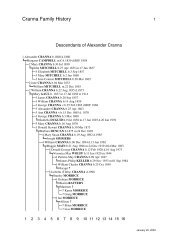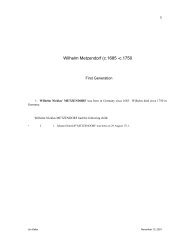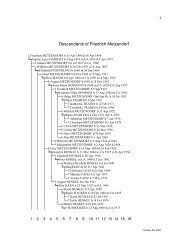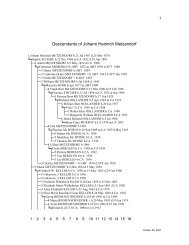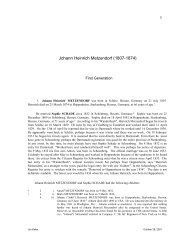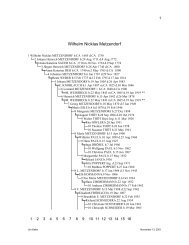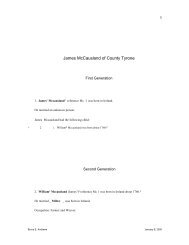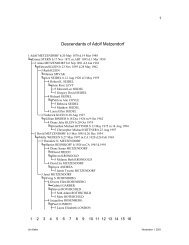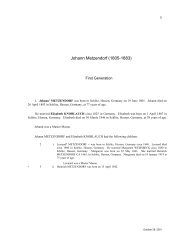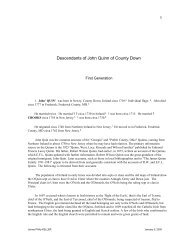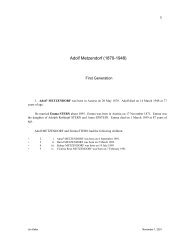The Quinn Family - Jim and Trish Keller
The Quinn Family - Jim and Trish Keller
The Quinn Family - Jim and Trish Keller
- No tags were found...
You also want an ePaper? Increase the reach of your titles
YUMPU automatically turns print PDFs into web optimized ePapers that Google loves.
A short Account of the <strong>Quinn</strong>, West, Lacy, Pottenger, Kincade <strong>and</strong> Wilson FamiliesE.F.L. <strong>Quinn</strong>{page 22}THE QUINN FAMILY1873-1925By E. F. L. <strong>Quinn</strong>(<strong>The</strong> following additional information about Gen’l. John <strong>Quinn</strong> is supplementary to R. W. <strong>Quinn</strong>’s account of hisfather <strong>and</strong> was all furnished by him. His service in the legislature <strong>and</strong> of the state board of Equilization is also shownin the published archives of the state of Ohio.)As heretofore stated he was for a number of years after 1820 Brigadier General of the Ohio Militia.At that period of the history of Ohio all citizens from 18 to 45 were required to serve in the militia, the company officersbeing elected by the men <strong>and</strong> the field officers by officers of lower rank. Each company <strong>and</strong> regiment had todrill a certain number of days in the year, but the great event of the year was the so-called “Big Muster,” when allthe militia in the county were required to assemble at the county seat for review <strong>and</strong> a sham battle. (Gen. John<strong>Quinn</strong> ‘s younger brother, Robert <strong>Quinn</strong>, was the colonel of one of the Preble county regiments.)In 1834 he was elected to represent Preble <strong>and</strong> Montgomery counties on the state board of equalization at Columbus.This board consisted of one member from each senatorial district <strong>and</strong> its duty was to equalize the assessments fortaxation throughout the state. He served on this board for two years <strong>and</strong> in 1837 he was elected to represent Preblecounty in the General Assembly at Columbus. He served in the Assembly for two years <strong>and</strong> then retired, decliningreelection <strong>and</strong> was never afterward a c<strong>and</strong>idate for political office.He was a Whig from the foundation of that party to its extinction. He supported the Native American (KnowNothing) party in 1854 <strong>and</strong> the Republican party from its birth to his own death. While at Columbus he attendedthe Episcopal church, the church in which his father had been baptized <strong>and</strong> the church of his ancestors, but which hehad not had any opportunity to attend, owing to their being no Episcopal church in Preble county.General John <strong>Quinn</strong> had a common school education, such as could be obtained in Georgia in his time, but in additionhe had the advantage of his mother’s teaching at home, she having had in her youth as good an education ascould be {page 23} obtained in Philadelphia. He was fond of reading throughout his life <strong>and</strong> was constantly adding tohis knowledge <strong>and</strong> he gave four of his sons a college education. In addition to his home farm he owned two farmsin Indiana, one of 160 acres near Crawfordsville <strong>and</strong> one of 160 acres near Kokomo, which he later transferred to hischildren. His wife also owned a farm of 80 acres near Crawfordsville, <strong>and</strong> his children jointly 320 acres nearLincoln, Nebraska.General John <strong>Quinn</strong> removed from his farm to the residence of his son Robert W. <strong>Quinn</strong> in Eaton <strong>and</strong> died there inFebruary, 1873, in the 84th year of his age. His widow died two weeks later at the age of 69.He had five sons, three of whom survived him—Thomas Pottenger <strong>Quinn</strong>, the eldest, was born on July 6, 1832,graduated at Farmers’ College near Cincinnati, <strong>and</strong> died unmarried, July 22, 1854.Robert Wilson <strong>Quinn</strong> (the author of the preceding account) was born September 18, 1835. He attended FarmersCollege near Cincinnati <strong>and</strong> later graduated from the Cincinnati Law School <strong>and</strong> was admitted to the bar. He wasfor a time in the law office of Bates & Scarborough in Cincinnati <strong>and</strong> at that time became acquainted with R. B.Hayes, afterwards a general in the Union army <strong>and</strong> President of the United States, but then practicing law inCincinnati. On January 10, 1861, Robert <strong>Quinn</strong> married Josephine M. Palmer, who at that time was 20 years ofage.During the war of the rebellion he served for four months in the 156th O. V. I., being stationed at Cumberl<strong>and</strong>, Md.,in 1864. He built a house in Eaton, Ohio, in 1872 <strong>and</strong> lived there until his death December 28, 1910.He served as mayor of Eaton <strong>and</strong> for six years, from 1882 to 1888 as Probate Judge of Preble county, having beenelected without opposition. He received the Republican nomination <strong>and</strong> the Democratic party made no nominationagainst him. He was not a c<strong>and</strong>idate for a third term but the Democratic leaders advised him that if he would be ac<strong>and</strong>idate for a third term he would not be opposed. He practiced law in Eaton both before <strong>and</strong> after he was ProbateJudge.His wife was descended on her father’s side from the Palmer family, a family of English descent, settled in Chestercounty, Pennsylvania, prior to 1700, <strong>and</strong> on her mother’s side from the Hawkins family of Engl<strong>and</strong>. Her motherwas born in London <strong>and</strong> her gr<strong>and</strong>father was a man of wealth, maintaining a house in London <strong>and</strong> a country home inthe west of Engl<strong>and</strong>.11



